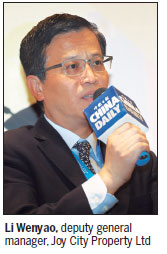China's emerging middle class in focus as Joy City aims for 20 by 2020
Updated: 2016-06-17 08:14
By Luo weiteng in Hong Kong(HK Edition)
|
|||||||
With the Chinese commercial property market buffeted by the specter of a flagging domestic economy, a supply glut and stiff competition fueled by e-commerce players, developers are banking on change and innovation to stand out in the crowd.
"The Chinese mainland's commercial property industry has reached a stage where a cluster of developers may find themselves reduced to less competitive market players, hamstrung by outdated management philosophy and unable to make any headway," Li Wenyao, deputy general manager of Joy City Property Ltd, told China Daily at the retail roundtable forum.
This is where Hong Kong-listed Joy City Property, with its competitive edge in management and operation, may have an advantage over rivals, Li said.
The company's ongoing project in Heping district in the city of Tianjin, slated to make its debut by the year-end, marks the developer's very first attempt to export its management "know-how".
Last December, the ambitious developer embarked on revamping the Exchange Mall in Tianjin into its flagship Joy City shopping mall, a project that will take the total number of Joy City malls under operation across the country to eight.
The Exchange Mall project also reflects the developer's switch to the light asset business model, which aims to ease the pressures on the company's balance sheet, Li noted.
The role that Joy City plays in the Tianjin project is as manager and operator, rather than stakeholder. But the developer shares the rental income and net operating income with Singapore state fund GIC.
Some previous practices like holding a 100 percent stake in a project and running the whole show are gradually changing, Li explained. For instance, 49 percent of the stake in its Joy City project in Yantai, Shandong province, for example, is held by GIC.
Hong Kong-listed Joy City Property, traded on the main board in Hong Kong, was in 2015 re-branded from COFCO Land Holdings Ltd, as a commercial property arm of the Chinese mainland's largest agricultural and foodstuffs produce supplier, COFCO Group.
The developer targets the emerging middle class, aged between 18 and 35, with their strong appetite for fashion, the latest trends and lifestyles, and heavy reliance on mobile phones and social media.
Such a consumer group may be too young to have deep pockets, but constitutes a rising force for the "fan economy" with a penchant for "shopping experience", a buzzword that many struggling brick-and-mortar retailers are betting big on to bring back the magic of physical shopping.
Rather than simply persuade consumers into spending big, Joy City is looking to build up vibrant and alive social settings, where the unique shopping and social experience may lead shoppers more naturally into consumption mode and ignite the power of word of mouth, Li said.
Dismissing suggestions that the booming e-commerce sector is taking a toll on the country's physical retailers and commercial property business, Li believes the online and offline businesses are complementary, and work together to create multi-dimensional shopping experiences for consumers.
In a bid to explore the massive online-to-offline market, Joy City has put its main focus on innovation, making the best use of mobile apps and mobile payments, and leveraging big data to track not only consumer trends but also the business performance of commercial tenants.
These innovations are what make Joy City stand out from other commercial property developers, Li pointed out.
Li expects the rapid urbanization underway in the world's second-largest economy to translate into robust market demand for commercial real estate developers in second- and third-tier cities.
A handful of projects in cities like Wuhan and Qingdao are now being negotiated by Joy City. But the company believes in taking it one step at a time, with its current primary goal being to establish 20 Joy City malls countrywide by the year 2020.
sophia@chinadailyhk.com

(HK Edition 06/17/2016 page11)